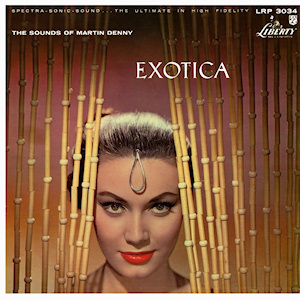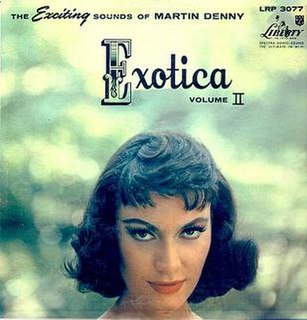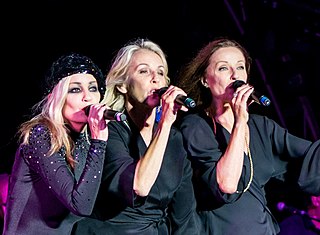
Bananarama are an English female pop music vocal duo, originally formed as a trio in London in 1981 by friends Sara Dallin, Siobhan Fahey and Keren Woodward. Their success on both pop and dance charts saw them listed in the Guinness World Records for achieving the world's highest number of chart entries by an all-female group. Between 1982 and 2009, they had 28 singles reach the Top 50 of the UK Singles Chart.
Martin Denny was an American piano-player and composer best known as the "father of exotica." In a long career that saw him performing well into the 1980s, he toured the world popularizing his brand of lounge music which included exotic percussion, imaginative rearrangements of popular songs, and original songs that celebrated Tiki culture.
Lounge music is a type of easy listening music popular in the 1950s and 1960s. It may be meant to evoke in the listeners the feeling of being in a place, usually with a tranquil theme, such as a jungle, an island paradise or outer space. The range of lounge music encompasses beautiful music–influenced instrumentals, modern electronica, while remaining thematically focused on its retro-space-age cultural elements. The earliest type of lounge music appeared during the 1920s and 1930s, and was known as light music. In the 21st century, the term lounge music may also be used to describe the types of music played in hotels, casinos, supermarkets, several restaurants, and piano bars.

"Cruel Summer" is a song recorded by the English girl group Bananarama. It was written by Steve Jolley, Tony Swain and Bananarama and produced by Swain and Jolley. Released as a single in 1983, it was initially a stand-alone single but was subsequently included on their self-titled second album which was released a year later, thus it is considered the album's first single. The song reached number eight on the UK Singles Chart in 1983, and after its inclusion in the 1984 film The Karate Kid it reached number nine on the U.S. Billboard Hot 100.

"Venus" is a song by Dutch rock band Shocking Blue, released as a single from their second studio album, At Home (1969). Written by Robbie van Leeuwen, the song topped the charts in nine countries. In 1981, it was used to open the "Stars on 45" medley. In 1986, English girl group Bananarama covered "Venus" for their third studio album, True Confessions, reaching number one in six countries. The composition has been featured in numerous films, television shows and commercials, and covered dozens of times by artists around the world.
"Pet Sounds" is an instrumental composed and produced by Brian Wilson and is the 12th track on the 1966 album Pet Sounds by American rock band the Beach Boys. Originally called "Run James Run", Wilson intended it to be used as the theme of a James Bond film. It was then titled "Pet Sounds", later also becoming the title of the album on which it appears. It is the second instrumental to feature on Pet Sounds, the other being "Let's Go Away for Awhile".
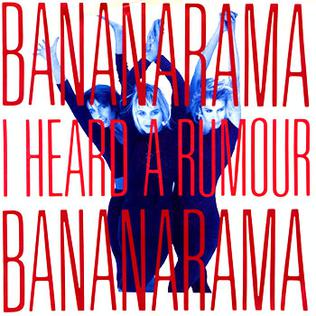
"I Heard a Rumour" is a song by the English girl group Bananarama from their fourth album Wow! (1987). It was also featured in the 1987 comedy film Disorderlies and included on its soundtrack.
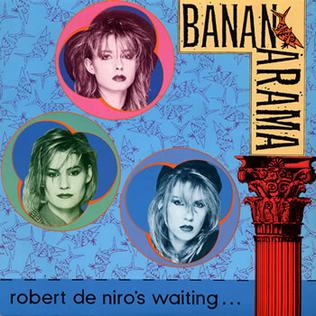
"Robert De Niro's Waiting..." is a song written by Steve Jolley, Tony Swain, and recorded by English girl group Bananarama. Produced by Jolley & Swain, it is the second single released from their self-titled second album in 1984, it namechecks American actor Robert De Niro.

"Love in the First Degree" is a song written and recorded by English girl group Bananarama. It is included on their fourth studio album Wow! and was released in 1987 as its second single except in the U.S., where it was released in 1988 as the album's third single. The track was co-written and produced by the Stock Aitken Waterman (SAW) trio.
Robert Drasnin was an American composer and clarinet player.
Gene Rains is a vibraphonist and leader of the Gene Rains Group, a jazz quartet from Hawaii that played a musical style known as Exotica. Rains' short career spanned the early to the mid-1960s and consisted of 4 LP recordings released on Decca Records and the Vocalion label. These LPs were released during the golden era of Hawaiian and Exotica music and the Tiki culture in the United States. The Gene Rains Group repertoire featured popular Hawaiian and Polynesian Island melodies as well as popular American tunes of the era.
"Quiet Village" is an orchestral pop instrumental that was written and originally performed by Les Baxter in 1951 and an instrumental album from 1959 by Martin Denny. In the liner notes to his album, Ritual of the Savage , Baxter described the themes he was conveying in the work:
[t]he jungle grows more dense as the river boat slowly makes its way into the deep interior. A snake slithers into the water, flushing a brilliantly plumaged bird who soars into the clearing above a quiet village. Here is a musical portrait of a tropical village deserted in the mid-day heat.

Takeshi "Tak" Shindo was a Japanese American musician, composer and arranger. He was one of the prominent artists in the exotica music genre during the late 1950s and early 1960s. Shindo also founded a dance band in 1947 and was a frequent lecturer and writer on Japanese music. He first gained prominence for his work on the 1957 motion picture Sayonara, served as the musical director for the television series Gunsmoke, and composed theme music for The Ed Sullivan Show and Wagon Train. He is most remembered for the exotica albums he released from 1958 to 1962, including Mganga! The Primitive Sounds of Tak Shindo (1958), Brass and Bamboo (1959) and Accent on Bamboo (1960). He also released several albums in Japan during the mid-1960s that blended American and Japanese musical traditions. In 1980, Shindo made a documentary film, Encounter with the Past, about the Manzanar relocation camp where he was relocated in 1942 as part of the Japanese American internment policy.

Quiet Village: The Exotic Sounds of Martin Denny was the eighth album by Martin Denny. Released in the summer of 1959, the monophonic version of the album reached No. 21 on the Billboard monophonic album chart in November 1959, and the stereophonic version reached No. 12 on the magazine's stereophonic album chart in January 1960.
Forbidden Island was the third album by Martin Denny. The album was produced in March 1958 at the Liberty Studios in Hollywood, following the group's nine-month gig performing at Don the Beachcomber's Bora Bora Lounge in Hawaii. Forbidden Island was Denny's first album to be recorded and released after vibraphonist Arthur Lyman left the group to pursue his own solo career. The album includes four original compositions by Denny: "Cobra", "Exotica", "Primitiva", and "Forbidden Island".
August "Augie" Borero Colon was an American musician known for his work as a percussionist in the exotica genre. He came to national fame as a member of Martin Denny's band in the 1950s and was the voice behind the bird calls and jungle sounds of the hit single "Quiet Village". He also recorded two solo albums, Sophisticated Savage (1959) and Chant of the Jungle (1960). In the early 1960s, Colon left Denny's group and toured with his own band known as The Tropicales.
